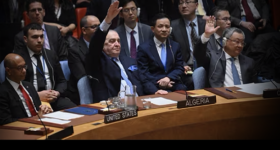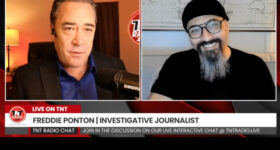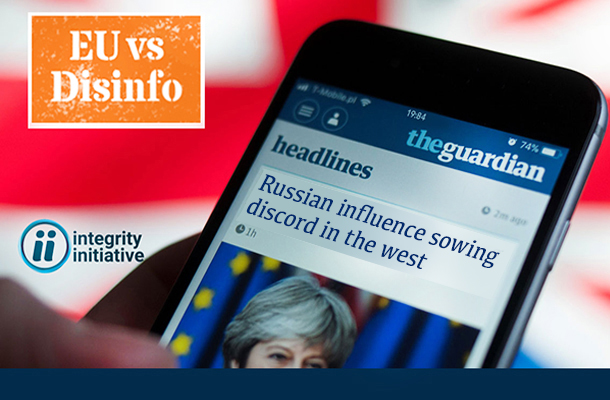
Nina Cross
21st Century Wire
It is now apparent with the release of the Mueller investigation findings, that the great storm that has embattled the US government and establishment since 2016 over supposed Russia-Trump collusion during the US elections, originates not from a genuine tangible source, but a constant stream of rhetoric driven by partisan corporate media. One certainty though is the Western narrative of Russia as a ‘malign influence’ will not go away. While America’s liberal establishment continues to rage at Trump, Europe allies, under the influence of Washington, maintain their aggressive stance towards Russia following the catastrophic US meddling in Ukraine in 2014 and the subsequent reunification of Crimea with Russia. The question is how can the narrative of ‘malign Russian influence’ be kept going? Mainstream media will continue its role in this, but Western governments are also pouring resources into promulgating certain narratives while containing others. This week, hackers released more documents from the UK government-funded project known as the Integrity Initiative, revealing British government plans to build an umbrella network of organisations across Europe to counter ‘Russian disinformation’. The following is a look at one of the EU projects already operating to ensure European populations do not stray from this constructed narrative that at times crosses over into real xenophobic racism, or Russophobia. While researching this phenomenon, it was impossible not to find some of the EU’s counter-propaganda material quite funny.
If we want to know the meaning of disinformation, the American think tank known as the National Endowment for Democracy which funds regime change in the service of US corporate interests, has its own definition, but it’s not important – so long as we believe Russia or the Nazis invented the problem. In fact, if we search the word ‘disinformation,’ a good number of the results tell us it originated in Russia and is the baby of Stalin or the KGB. If we are not careful, we could end up thinking that dishonesty is an inherent characteristic of Russians, a view actually promoted by the former US Director of National Intelligence, James Clapper, who, coincidentally was caught ‘wilfully’ lying to Congress.
The view of Russians being hard-wired for corruption was also promoted by the New York Times in an article published in February, The Putin I knew; the Putin I know, written by Franz J Sedelmeyer, exposing deep prejudice behind the corporate media’s shallow identity politics.
Five years into the annexation, Crimea is still not “ours,” still not a part of Russia. Insisting on that is to disinform, and repeating the slogan does not make it happen. https://t.co/fEECm1zsoV
— EU Mythbusters (@EUvsDisinfo) February 18, 2019
But this narrative fails to credit the CIA, which has spent decades crafting skills carrying out the most grotesque deceptions in history targeted abroad and at home. To leave out the role of the CIA in disinformation must be the equivalent of writing an omelette recipe and leaving out the eggs. In fact, the CIA doesn’t just carry out disinformation campaigns, as Victor Marchetti, former special assistant to the Deputy Director of the CIA described it: the CIA manufactures history. Not to recognise American intelligence services or government in the history of disinformation while painting Russia as its mother is to deprive America of the recognition it deserves for one of its most notable institutions. Somewhat ironically, you can learn all about the history of disinformation from both Google and the National Endowment for Democracy which are two entities which have received financial support from the CIA.
What about the EU? Does Brussels think that Russia is an inherently dishonest nation? Are they aware that the CIA could be manufacturing Europe’s history this very moment? Members of the European Parliament (MEPs) so concerned about disinformation might want to study the documented atrocities of the CIA, some of which were carried out in Europe. Perhaps they are not aware of the US intelligence services’ role in the history of subterfuge in Europe:
…memorandum, dated July 26, 1950, gives instructions for a campaign to promote a fully fledged European parliament. It is signed by Gen William J Donovan, head of the American wartime Office of Strategic Services, precursor of the CIA.
Paradoxically, given the probability rate of the CIA meddling in the EU, MEPs should consider putting out a public warning:
The CIA is the most likely source of disinformation in Europe today. It manufactures crises – and we’ve plenty of those.
But none of it. Instead, the European Parliament is fixated on ensuring its populations fear Russia and are accepting of the narratives pushed on them. The EU released a new report this month repeating the narratives it has been accumulating to justify increasing actions against Russia, particularly since 2014 following the reunification of Crimea. It has passed a resolution stating that Russia could no longer be considered a strategic partner of the EU:
While condemning the illegal occupation and annexation of Crimea, as well as Russia’s continued violation of the territorial integrity of Georgia and Moldova, Members stressed that the EU cannot envisage a gradual return to business as usual until Russia fully implements the Minsk Agreement and restores the territorial integrity of Ukraine…
Members condemned Russia’s involvement in the Skripal case, and in disinformation campaigns and cyberattacks carried out by the Russian intelligence services aimed at destabilising public and private communications infrastructure and at increasing tensions within the EU and its Member States…
They are concerned about the relations between the Russian government and the extreme right-wing and populist nationalist parties and governments in the EU, such as in Hungary. They also recalled that the interference of Russian state actors in the referendum campaign on Brexit is currently under investigation by the UK authorities…
As Russia can no longer be considered a strategic partner in the current circumstances, Members believe that the Partnership and Cooperation Agreement should be reconsidered…
Ministry of Truth?
@anneapplebaum Never said anything like that!
— Federica Mogherini (@FedericaMog) January 14, 2015
As well as the coordinated strategic isolation of Russia by the EU, members of the G7 have signed up to a Rapid Response Mechanism (RRM) designed to:
see hostile states publicly ‘called out’ for their egregious behaviour – with coordinated international attribution of cyber and other attacks.
The agreement involves sharing intelligence, attribution of hostile activity and forming a common narrative and response, effectively a military-like propaganda coordination between the countries that can be applied for a chosen agenda.
To protect its version of history the EU has created mechanisms to fight off alternative realities, narratives, or truths – which ever word fits – claiming any fact or opinion contrary to those of the stated EU decree must be condemned as pro-Kremlin, pro-Russian, or ‘Putinist’, a derogatory depiction presently supported by the corporate media. The EU claims these ‘alternative narratives’ are the product of a Russian disinformation campaign and has developed resources to ‘disprove’ that disinformation. These are the EU vanguards of truth set up and funded by the European Council in 2015: the European External Action Service East Stratcom Task Force or unaffectionately known here as Team East Stratcom. A brief study of their work only leads to further concerns about who is manufacturing history, but also to the likely conclusion that Team East Stratcom is made up of media studies students who drink beer and watch RT all day.
Here’s how Team East Stratcom describes itself in a Q&A:
Does the team engage in counter-propaganda?
No. It …identifies and corrects disinformation
Counter-propaganda vs correct disinformation (you say tomatto, I say tomayto).
Julian King, the EU’s security commissioner, has described it as a counter-propaganda cell. Come on Brussels, make up your mind.
What does Team East StratCom do, and what is the role of its website EUVDisinfo?
The Task Force reports on and analyses disinformation trends, explains and exposes disinformation narratives, and raises awareness of disinformation coming from Russian State, Russian sources and spread in the Eastern neighbourhood media space
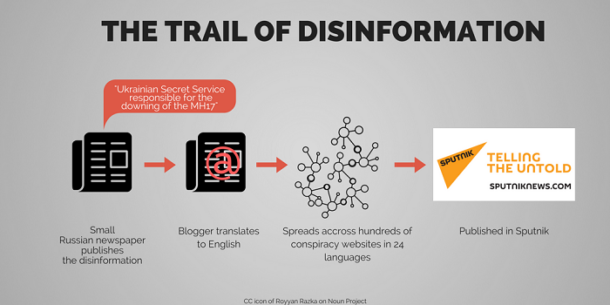
RUSSIAN MEMES: Official EU conspiracy theory diagram explains how ‘Russian disinfo’ permeates mainstream western discourse (EU External Action 2017)
Firstly, who defines what is disinformation? Is it just assumed that any information emanating from a Russian media outlet is automatically disinformation?
Narratives and sources. Does this mean that any narrative which matches a Russian one is then classed as Russian in origin? If a Western alternative media outlet publishes a narrative which happens to match that of a Russian media outlet, does this then mean that the said alternative media outlet is ‘under Russian influence’, or ‘in league with the Kremlin’? Could such a politicized method of labelling lead to potential McCarthyite targeting of independent journalists?
The Task Force does not target opinions and does not seek to “blacklist” anyone. It checks facts and identifies disinformation coming from Russian State, Russian language and Eastern Neighbourhood media. It focuses on the disinformation message, not the messenger.
Yet, individual journalists are identified in many of these so-called ‘disinformation cases’ and described as supporters of one leader or other on the EU’s list of bogeymen. Team East StratCom – there is no need to be shy about McCarthyism. Certain mainstream media stalwarts of establishment narratives are more upfront about whom they do and do not want in the club, as Oliver Kamm of The Times has demonstrated:
That’s right. If your CV includes RT or Sputnik, you’re not going to get an interview, let alone a job, with a serious news org. Hence my periodic advice to young people ambitious for a career in journalism that these places are definitive career-enders.
— Oliver Kamm (@OliverKamm) January 5, 2019
For an agency already struggling with the concept of truth, Team East StratCom is not off to a great start.
So how does Team East StratCom protect EU narratives? The European Council made it clear in 2015 they wanted to counter narratives about regime change in Ukraine and its consequences. In fact, about half of its ‘disinformation cases’ are about Ukraine:
Ukraine tops the EUvsDisinfo database as the most frequent target with 461 references among a total of 1,000 disinformation cases reported in the course of 2018.
So how does Team East StratCom counter propaganda… sorry… correct disinformation? The following are a few case samples that help to illuminate their methodologies (although with a budget increase from €1.1 million in 2018 to €3 million in 2019, it may find new and diverse ones):
Disinformation Example 1: Ukraine is the most corrupt country in Europe
Team East StratCom argues that undermining the credibility of Ukraine benefits Russia. It reports that RT Deutsch described Ukraine as the most corrupt country in Europe. It then tries to debunk this using Transparency International’s corruption perception index, a chart which is created and paid for by Western neoliberal governments – the same ones that help to keep corrupt governments in power so long as they provide opportunities to serve Western corporate interests.
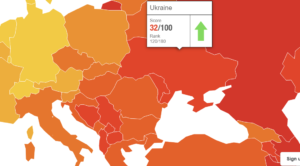 Team East StratCom tries to disprove this case by drawing our attention away from corruption in Europe to corruption worldwide. This puts 60 countries ahead of Ukraine. That is sneaky Team East StratCom because, aside from Russia, which we must believe is the most corrupt country in Europe, Ukraine actually tops the list. So why does the EU want to hide the extent of corruption in Ukraine and is it the only thing being hidden about the country? According to Russian Foreign Ministry Spokeswoman Maria Zakharova the West wants to stop the world from recognising Crimea as part of Russia’s territory. In order to do this it must maintain a manufactured reality; the narrative of Ukraine being a victim of Russian aggression and in no way a liability due, at least in part, to the West’s meddling. This approach also entails downplaying any suggestion that the West planned and orchestrated a coup d’etat in Kiev in February 2014.
Team East StratCom tries to disprove this case by drawing our attention away from corruption in Europe to corruption worldwide. This puts 60 countries ahead of Ukraine. That is sneaky Team East StratCom because, aside from Russia, which we must believe is the most corrupt country in Europe, Ukraine actually tops the list. So why does the EU want to hide the extent of corruption in Ukraine and is it the only thing being hidden about the country? According to Russian Foreign Ministry Spokeswoman Maria Zakharova the West wants to stop the world from recognising Crimea as part of Russia’s territory. In order to do this it must maintain a manufactured reality; the narrative of Ukraine being a victim of Russian aggression and in no way a liability due, at least in part, to the West’s meddling. This approach also entails downplaying any suggestion that the West planned and orchestrated a coup d’etat in Kiev in February 2014.
Disinformation Example 2: Far-right groups in Ukraine
This extract by Team East StratCom criticises the reporting of far-right groups in Ukraine:
Dehumanise, demoralise, make Ukraine the guilty party
Pro-Kremlin disinformation about Ukraine targets audiences in Russia, in Ukraine and in third countries, including the West. Domestic audiences in Russia are e.g. faced with narratives which dehumanise Ukrainians and show the authorities in Kyiv as a cynical modern heir to 20th century Nazism. Such a strategy can turn Ukraine into an acceptable target of the Kremlin’s military aggression.
The involvement of far right groups in the run-up to and during 2014 Maidan events and since, has already been widely reported across much of the global mainstream media, for example, here, here, here, here and here, as well as in alternate media. To suggest that this narrative is Russian disinformation is ludicrous. What’s more, the European Parliament have already recognised in 2012 the threat of the far-right parties like Svoboda and Pravi Sektor in Ukrainian politics:
Parliament goes on to express concern about the rising nationalistic sentiment in Ukraine, expressed in support for the Svoboda Party, which, as a result, is one of the two new parties to enter the Verkhovna Rada. It recalls that racist, anti-Semitic and xenophobic views go against the EU’s fundamental values and principles and therefore appeals to pro-democratic parties in the Verkhovna Rada not to associate with, endorse or form coalitions with this party.
Team East StratCom, you are implying the EU dehumanised Ukraine! But then the EU did later drop its objection as members of the same racist, anti-Semitic and xenophobic party gained positions in Ukraine’s government, so perhaps you will be forgiven. Perhaps sowing a little confusion of its own, is Brussels.
Disinformation Example 3: Russia is depicted as a ‘defender’ and a ‘peacekeeper’ and the West – as the villain.
Team East Stratcom likes using Twitter graphics as evidence when ‘disproving pro-Kremlin disinformation.’ Never mind history, reason and common sense – just bring out a nice Twitter graphic! According to disinfo mavens, any spike in Twitter activity with the words ‘Russia’ ‘Moscow’ or ‘Putin’ in reference to Venezuela is proof of a ‘pro-Kremlin’ disinformation campaign, says Team East StratCom. Here is their graphical chart of Twitter traffic:
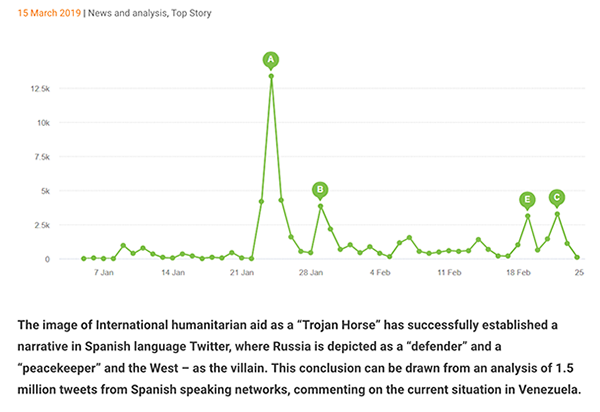
But Russia is an ally of Venezuela so why would this not be reflected on Twitter when there is a blatant attempt by a Western aggressor to impose its military and economic will on Venezuela? Such was the situation in February when the US tried to pressure the Venezuelan government into allowing in trucks, supposedly carrying humanitarian aid, into the country. Aid as a Trojan Horse for weapons has historical context, especially with regards to the US and its new special envoy to Venezuela, Elliot Abrams, a convicted war criminal who illicitly supplied weapons to death squads in Nicaragua, El Salvador and Guatemala on behalf of the Reagan presidency in the 1980s. Now that he is special envoy to Venezuela, it is common sense to suspect foul play. Can such people really be seen as peacekeepers, Team East Stratcom? And using a Twitter graphic to divert attention from a flagrant coup attempt by an aggressive power is more than a little contemptible. What’s more, a few days afterwards, one of those trucks carrying supplies was found to contain nails and other materials useful for making barricades:
https://twitter.com/Gerrrty/status/1100697117960650752
And so to sum up the tactics used by Team East StratCom for ‘disproving pro-Kremlin disinformation’, based on the above cases alone, a list could include for starters:
- Categorical denial of any wrongdoing by Western powers or NATO members
- Label any information emanating from a Russia media outlet as ‘disinformation’ or ‘Kremlin propaganda’
- Discredit alternate media journalists who stray from Official Washington/London/Brussels position
- Diversion and distraction – dazzle the public with colourful Twitter graphics
- Remove any key political, geopolitical context
- Obscure or erase history
- Use of online tools like the Corruption Index promoted by same Western governments that fund bloody imperialist wars
- Use emotive, jingoistic themes
- Associate perceived ideological opponents with leaders on Western bogeyman list
- Repetition of pejorative terms and ad hominem smears such as ‘pro-Kremlin’ and’ ‘Putinist’ to create division
- Infer that any dissenter in the West is a ‘traitor.’
Here's our @bbcnewsnight film on Sputnik News in UK. With tensions between Russian and UK growing I was on my diplomatic best behaviour. 1st Q: "what's it like being a traitor?" https://t.co/nml6KTxc9S
https://t.co/MVeaopZP0f— John Sweeney (@johnsweeneyroar) January 17, 2019
But Team East StratCom can’t erase history or delete context or bore us half to death with those Twitter graphics and still expect to retain their credibility.
What’s more, given the Russia-Trump collusion narrative has been exposed as a hoax, Team East StratCom really ought to let that one go.
Anyone for a pint?
***
Author Nina Cross is an independent writer and researcher, and contributor to 21WIRE. To see more of her work, visit Nina’s archive.
READ MORE DISINFORMATION NEWS AT: 21st Century Wire Disinformation Files
SUPPORT 21WIRE – SUBSCRIBE & BECOME A MEMBER @21WIRE.TV





